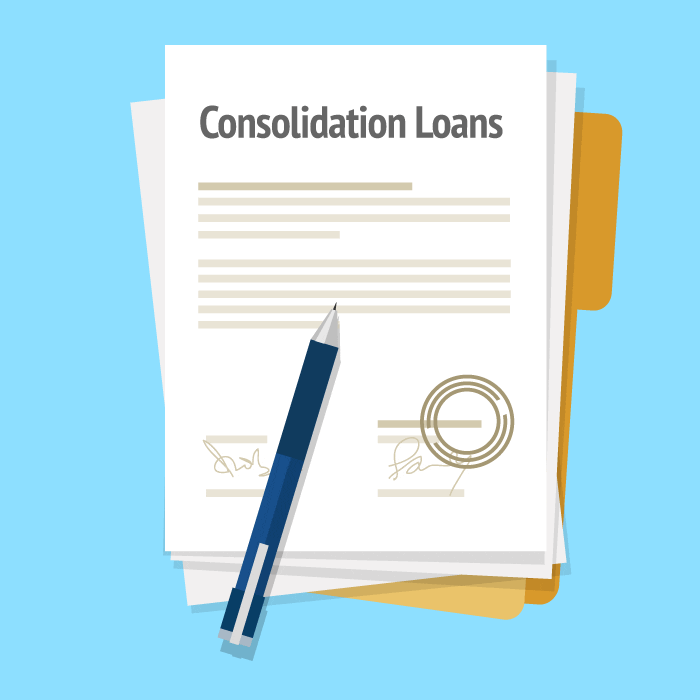
Dealing with multiple debts can be overwhelming, and managing various payments with different interest rates can lead to financial stress. Debt consolidation loans emerge as a potential solution, offering individuals the chance to simplify their financial obligations. However, like any financial strategy, debt consolidation loans come with both advantages and disadvantages. In this article, we will delve into the concept of debt consolidation loans, outlining the pros and cons to help individuals make informed decisions about managing their debt.
Pros of Debt Consolidation Loans:
1.Simplified Repayment:
One of the primary advantages of debt consolidation is the simplification of repayment. Instead of juggling multiple payments and due dates, a consolidation loan allows you to combine various debts into a single monthly payment. This streamlining can make it easier to manage your finances, reducing the risk of missed payments.
2. Potential for Lower Interest Rates:
Debt consolidation loans often come with a fixed interest rate that may be lower than the average interest rates on your existing debts. By securing a lower interest rate, you can reduce the overall cost of borrowing and potentially save money in interest payments over the life of the loan.
3. Clear Path to Debt Repayment:
With a debt consolidation loan, you have a clear path to becoming debt-free. The loan typically comes with a fixed term, meaning you know exactly when you'll have repaid the entirety of your consolidated debt. This can provide a sense of structure and motivation for those seeking financial freedom.
4. Improved Credit Score:
Successfully managing a debt consolidation loan can positively impact your credit score. By making consistent, on-time payments, you demonstrate responsible financial behavior, which can contribute to an improvement in your creditworthiness over time.
Cons of Debt Consolidation Loans:
1. Risk of Accumulating New Debt:
One potential drawback of debt consolidation is the risk of accumulating new debt. Once the burden of multiple payments is lifted, some individuals may be tempted to incur additional debt, potentially exacerbating their financial situation.
2. Origination Fees and Costs:
Debt consolidation loans may come with origination fees, closing costs, or other associated fees. It's crucial to factor in these costs when assessing the overall benefit of consolidation, as they can impact the total amount you'll pay to resolve your debts.
3. Not a Solution for All Debt Types:
Debt consolidation is not suitable for all types of debt. For example, if you have high-interest credit card debt and the consolidation loan's interest rate is not significantly lower, the benefits may be limited. Additionally, certain debts like tax liens or student loans may not be eligible for consolidation through traditional methods.
4. Potential for Prolonged Repayment:
While a debt consolidation loan may offer a clear repayment plan, it could potentially extend the duration of your debt repayment. This means that, although you may have a more manageable monthly payment, you could end up paying more in interest over the life of the loan.
When Debt Consolidation Can Be Beneficial:
1. High-Interest Credit Card Debt:
Debt consolidation can be particularly beneficial for those dealing with high-interest credit card debt. If the consolidation loan offers a lower interest rate, it can result in substantial savings over time.
2. Multiple High-Interest Debts:
Individuals with various high-interest debts, such as personal loans or medical bills, may find relief through consolidation. Combining these debts into a single, lower-interest loan can simplify repayment.
3. Improved Financial Discipline:
Debt consolidation works best for individuals committed to improving their financial habits. If you are dedicated to making on-time payments and avoiding new debt, consolidation can be a powerful tool for regaining control of your finances.
Potential Pitfalls to Be Aware of:
1. Continued Overspending:
Consolidating debt doesn't address the root cause of financial troubles. Without addressing spending habits, individuals may find themselves accumulating new debt even after consolidating existing obligations.
2. Choosing the Wrong Loan:
Selecting a debt consolidation loan with unfavorable terms can negate the benefits. It's crucial to thoroughly research and compare loan options, considering interest rates, fees, and repayment terms.
3. Failure to Address Underlying Issues:
Debt consolidation is a financial tool, not a cure-all. If the root cause of debt is unresolved, individuals may find themselves back in a similar situation after consolidating their debts.
Conclusion:
Debt consolidation loans offer a viable strategy for simplifying repayment and potentially reducing interest costs. However, it's essential to approach this financial tool with a clear understanding of both its advantages and disadvantages. Before pursuing debt consolidation, individuals should assess their financial habits, research available loan options, and consider seeking professional advice to ensure that consolidation aligns with their unique financial goals. When used wisely and in conjunction with improved financial discipline, debt consolidation can be a valuable step towards achieving financial stability and freedom.
